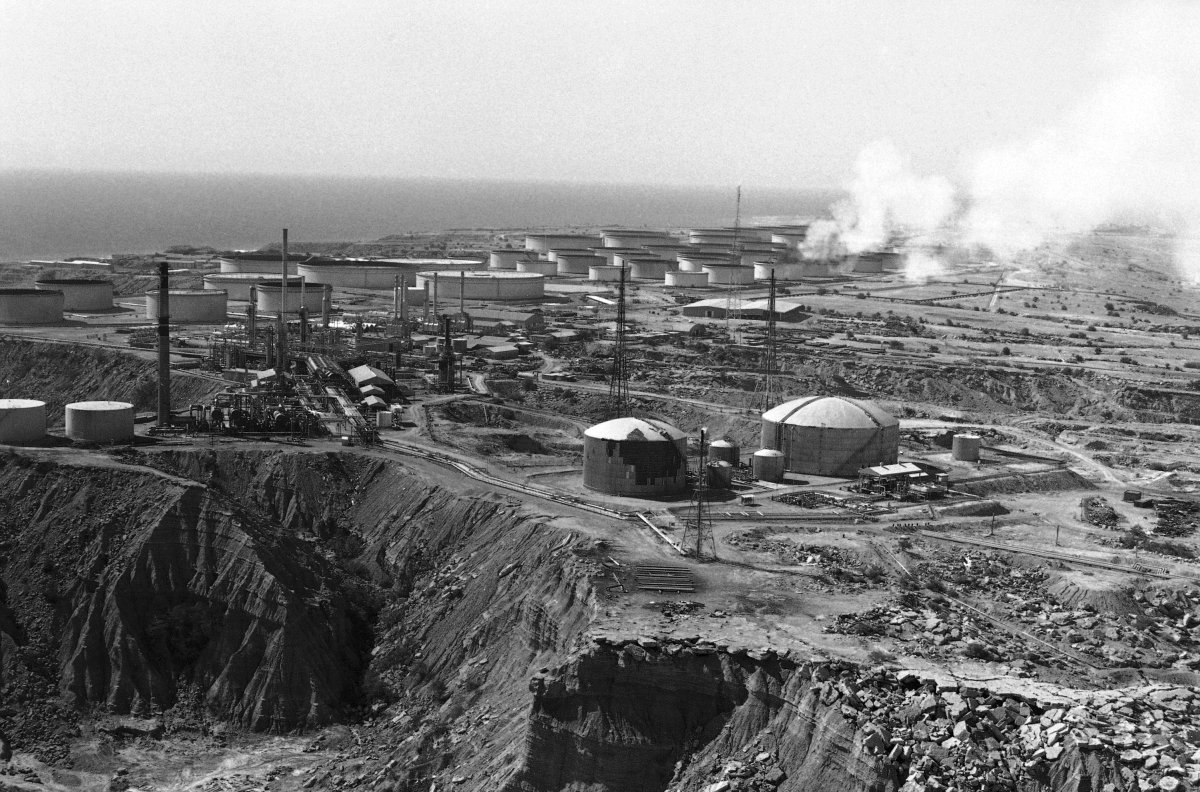Iran’s oil exports dropped by around 42 percent in early October amid fears surrounding Israeli strike threats likely targeting Iranian oil sites, according to Oil&Gas.
Tanker tracking firm data indicated that Iranian oil exports fell to 600,000 barrels of oil loaded per day in the first 10 days of the month, rather than the average 1.4 million barrels per day seen in recent months.
Israeli Prime Minister Benjamin Netanyahu has vowed Iran will “pay for” its strike on Israel on October 1, when Iran fired approximately 180 missiles, according to Reuters. Israel is rumored to be considering attacking Iran’s oil sites.

An oil terminal in Tehran photographed on November 13, 1979. Iranian oil sites are reportedly in danger of being the target of an upcoming Israeli strike in retaliation for Iranian strikes against Israel.
Mohammad Sayad/Associated Press
Newsweek reached out to the Iran Ministry of Petroleum for comment via email.
Satellite imagery recently showed oil tankers vacating the waters surrounding Kharg Island, Iran’s main oil terminal, which some fear may be Israel’s target, according to CNBC.
Iranian oil exports are expected to remain lower throughout this month and reach a maximum of 1.35 million barrels per day, according to OilPrice.com.
Adding to Iran’s struggles with oil exports, the U.S. recently imposed further sanctions on Iran’s “ghost fleet” of ships and companies in the United Arab Emirates, Liberia, Hong Kong, and other locations that transport and aid oil exports to buyers in Asia on October 11.
These sanctions follow Iran’s strike on Israel on October 1, and U.S. national security adviser Jake Sullivan said the sanctions will “help further deny Iran financial resources used to support its missile programs and provide support for terrorist groups that threaten the United States, its allies and partners.”
Anoush Ehteshami, a political scientist and professor of International Relations in the School of Government and International Affairs at Durham University, spoke to Newsweek about how Iran’s decrease in oil exports could affect the U.S. politically and economically.
Ehteshami said, “In terms of the U.S.’ own energy policy, if anything it enhances Biden’s hand. The U.S. is now the world’s premium producer, and as it happens, also exporting to lots of places, including Europe of oil products and oil itself and of course, energy as well. So, the less comes out of the Persian Gulf, the more reliant the major economies are going to be on the U.S. In one sense, Iran’s isolation in the absence of increased production by the Saudis, the Iraqis, and the Marathis, will mean a growing demand for U.S. production of exports.”
He went on to explain that in previous historical instances where Iran has faced oil export crises of this nature, Saudi Arabia has “loosened the taps” and “allow more oil to come onto the market in order to stabilize prices,” but emphasized that they may not do so in this instance as Iran may see the action as “pro-American” and therefore against their own diplomatic ties with the country.
Ehteshami did note that Russia, like the U.S., could benefit from Iran’s decrease in oil exports, and that he believes Japan, South Korea, China, and India will the consumers who are “going to be most concerned about any tightening of the international oil markets, because they are the ones who are directly dependent on market fluctuations internationally.”
He continued, “Nevertheless, it’s not about Iran itself, to tightening of Iranian export capability that matters. Because oil prices are volatile, and they always tend to have a worst-case scenario outlook down the line, a week, a month, three months, and so on. It’s the perception of how American Iranian tensions, Iranian Israeli tensions are interpreted in oil markets that really matters.”
Ehteshami also spoke at length about the effects of the U.S.’ new sanctions on Iran’s oil exports and moreover, the Iranian economy at large, highlighting that it will affect the economic situation “very gravely.”
He said, “Iran’s economy is already on its knees because of sanctions, because of incompetent management, because of cronyism and corruption, and also because, frankly, of lack of investment by much of the world in development and modernization of infrastructure. Oil has been one of the lifelines, and China in particular has been very happy to continue to buy discounted Iranian oil, but this has declined.
Ehteshami attributed China’s declining demand for oil from Iran to Russia’s oil exports, and emphasized that if Iran’s oil competitors manage to increase output and meet global market demands, Iran will suffer and it will have heavy effects on the currency, inflation, imports, and “the country’s ability to continue to maintain a general macroeconomic position at home.”
This decrease in oil exports follows Iran’s previous economic high earlier this year, as Iranian exports hit 1.82 million barrels per day in March, the highest rate in six years, and overall exports of 141.7 million barrels in the first quarter of this year according to Foundation for Defense of Democracies.
Do you have a story we should be covering? Do you have any questions about this article? Contact LiveNews@newsweek.com.









